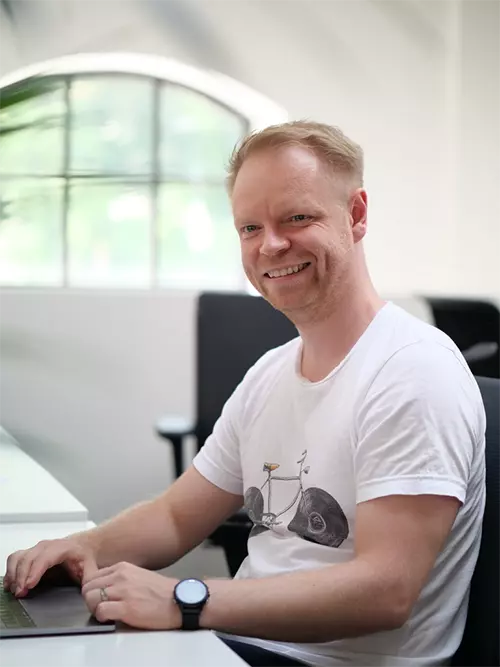FutuStories - Nine things I've learned by Antti
Antti is a Senior Business Development Manager. Here he shares nine valuable insights he has learned at Futurice and as an expat from Finland in Munich.

As a pragmatist, I am trying to solve the problem at the moment it occurs and I am quick to throw a lot of ideas into the room which needs validation from the rest of the team – so collaboration is key here, too. Clients seem to appreciate my very pragmatic and solution-prone approach to problems. I am not trying to make a huge fuss about it, I am simply trying to find solutions.
1 How to make your client happy
It all comes down to providing value by delivering useful products and services – without a good team, there is no good delivery. What makes a good team? The ability to communicate, to discuss and to solve problems together. And the team also needs to do a bit of advertisement for their solutions and not only do the magic but also tell the world (or at least the client) about it.
2 What collaboration can do
When building a solution collaboratively, we deliver much better results – no matter the size of the team. We are having more fun, we validate each others’ thoughts and give valuable feedback. From my perspective, the biggest hassle of teams is that people often work on different projects at the same time and only have limited time and attention to give. The challenge is to bring the right people together and have them play the same game. What helps is to book people early and explain the importance of the task.

3 How to succeed as a pragmatist
As a pragmatist, I am trying to solve the problem at the moment it occurs and I am quick to throw a lot of ideas into the room which needs validation from the rest of the team – so collaboration is key here, too. Clients seem to appreciate my very pragmatic and solution-prone approach to problems. I am not trying to make a huge fuss about it, I am simply trying to find solutions.
4 How to figure out your own system
We are all different operating systems which we need to figure out and configure. It is not a one size fits all kind of thing, you need to actively look out for other peoples’ systems and learn from them. A big part is organizing your attention, more specifically your time plus energy and focus. That means you need to plan your days according to your energy levels and tasks that either bring or drain your energy. I personally feel like good planning is the most important thing in order to be successful in my job.
5 What does experience really mean
Experiencing different cultures gives you different lenses to look at the world. I’ve always liked to travel, widen my horizon, get different perspectives on the world and therefore gain ‘experience’ which is highly valued in the professional world. But what does experience actually mean? It doesn't necessarily mean having twenty years of work experience in one job. Experience rather means acquiring the ability to apply learnings at the right moment. The more different situations you have found yourself in, the more learnings you can choose from and apply to new settings. This is what experience means to me and what my expat experience has primarily taught me.
6 How Finnish is Futurice Germany
At all our German sites you can feel that it is a Finnish company. However, it is still not Futurice Finland and frankly, it shouldn’t be either. It is a good thing that each site is a different place with a similar feeling. As all offices are operating in a different environment, economic and client structure, the same ways of working do not play out everywhere the same way. What’s important is that all offices reflect our community and culture and our values are carried out across all different sites. I think it can be experienced quite quickly that we have a culture of trust – no matter which country location.
7 How to adapt as an expat
The location-specific characteristics have such a huge impact on company cultures and operation modes, so it would be too easy to believe that you can simply adapt all good practices from Finland. It takes some validation to see whether good practices from one country also work in another one. There are two levels of adaptation: first, you need to understand the learnings from one culture on a deeper level and then apply them appropriately to another culture. Second, we usually already expect differences before we first-hand experience a new culture, but it takes some effort to actually feel and handle those differences in real life.
8 What can Germans learn from Finns
I sometimes miss that Finns do not take work as seriously as Germans. I think work should be fun and some joking makes day to day work life lighter. The Finnish working attitude fits the world’s move towards a more agile and collaborative style. In a more relaxed environment, where there is no perfect plan, the results come more natural and expectations can be managed in a better way. At the same time, there are things I highly value the German working culture. I like that Germans not only take work but also their free time very seriously. I think Germans actively use their free time and after work nights for nice activities. They find their balance which reflects positively in their work performance.
9 How to find your balance
I learned that it is important to actively recharge your batteries. What helps me to fill my energy reserves is mostly spending time with my family. I am lucky to see the way my little son faces challenges and tries to solve them which is enormously uplifting. Also, spend time in nature, travel and plan further trips.
Interested in reading more stories about us and our people? At Futurice, we celebrate diversity and cherish everyone's unique journey. Check out our Welcome Home page and get inspired by more journeys shaping our culture. If you would like to read more stories and get to know our people, our sites and the community better, check out the global version of our FutuStories Booklet.
 Chiara FürstMarketing Assistant
Chiara FürstMarketing Assistant



